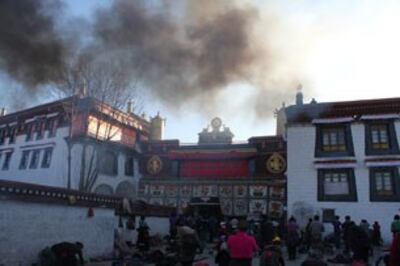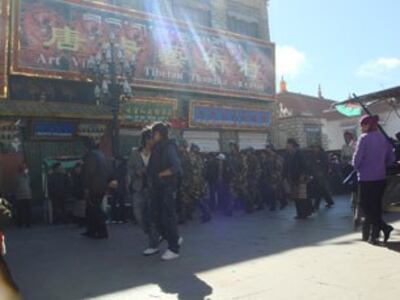KATHMANDU—Tibetans inside China burned incense, prayed, and raised Buddhist prayer flags ahead of their exiled leader’s first White House meeting with U.S. President Barack Obama, despite tighter security by Chinese authorities who regard the Dalai Lama as a dangerous separatist.
In Lhasa, capital of the Tibet Autonomous Region (TAR) and the epicenter of a 2008 anti-Chinese uprising, witnesses reported stepped-up security beginning on Wednesday, including several hundred armed personnel, in the city and concentrated around the Barkhor area in particular.

But Tibetans were undeterred, one man said, speaking on condition of anonymity.
“The Tibetans visited the Jokhang temple and Potala Palace in an unending stream of people."
"They offered flowers and incense to the private chamber of His Holiness the Dalai Lama in the Potala Palace” for the first time, he said.
“Many of them gathered around the Jokhang and Potala Palace and burnt incense wishing for the success of the meeting,” he said.
The Jokhang is Lhasa’s main temple, and the Potala Palace was the Dalai Lama’s residence until he fled to India after a failed uprising in 1959.
Another source said Tibetans had come to Lhasa from other parts of the country on a pilgrimage, notably from Amdo and Kham.

Obama—who like the Dalai Lama is a Nobel Peace laureate—used the moment to press Beijing, which has drawn international criticism for its heavy-handed treatment of Tibet, to preserve “[Tibet's] unique religious, cultural, and linguistic identity and the protection of human rights for Tibetans in the People’s Republic of China.”
Obama encouraged China and the Dalai Lama's envoys to continue efforts to resolve their differences through negotiations, the White House said, although the talks have yet to achieve concrete progress.
A spokesman based in Dharamsala, northern India, for the new Kirti monastery in Aba [in Chinese, Ngaba] prefecture in China's Sichuan province, said some 2,000 Tibetans had gathered near the monastery to burn incense, set off fireworks, and say prayers ahead of the meeting.
“Many Tibetans in the town threw Tibetan prayer flags in the air and shouted in jubilation,” he said.
In Chigdril [in Chinese, Jiuzhi] and Gade [Gande] in Golog prefecture, in Qinghai, “several hundred Tibetans from Chamda monastery and surrounding Tibetan villages gathered to welcome the meeting at about 8 p.m. Thursday for about an hour with fireworks,” another source said.
“They also burnt incense and set off fireworks … Even Gade county middle-school students set off fireworks, and then the local Public Security Bureau arrived and intervened,” the source said.
In Rebkong [Tongren], a monk who identified himself as Zokhang said residents regarded the meeting “as a big event.”
“I am extremely happy that the meeting is taking place,” he said.
Original reporting by RFA's Tibetan service. Tibetan service director: Jigme Ngapo. Translated by Karma Dorjee. Written for the Web in English by Sarah Jackson-Han.
